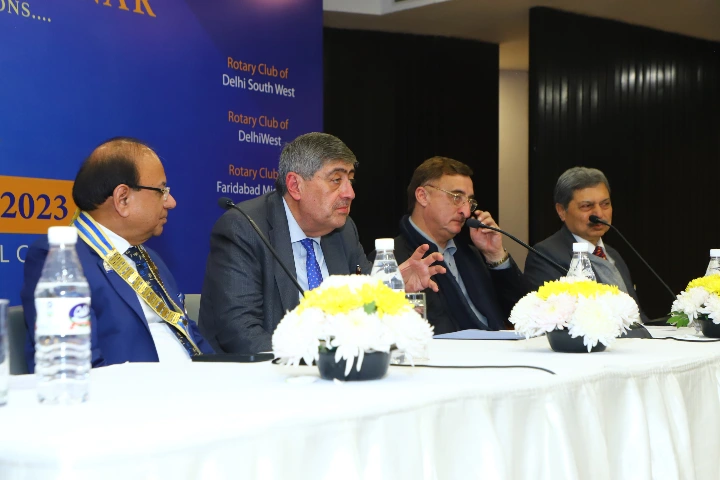

Justice Sanjay Kishan Kaul (second from left) with Rajya Sabha MP and senior advocate Vivek Tankha (third from left) at the Rotary seminar on legal aid
Supreme Court judge, Justice Sanjay Kishan Kaul said that more than 50 per cent of the litigation in India is by “government authorities on other government authorities”. He said that while more than half of the cases are filed by the government, the cost of this litigation is borne by the people.
Justice Kaul was speaking at an event organised by Rotary India, Legal Aid Seminar – Expanding Horizons, a brainstorming event to provide legal aid to the destitute who are not aware of their rights and do not have access to justice.
Highlighting the challenges in the Indian legal system, he said that the US Supreme Court hears about 100 cases every year, while the Indian Supreme Court hears 100 cases every week, adding that Indian courts are burdened with a heavy volume of litigation, most of which is by government authorities.
Justice Kaul emphasised on the need for India to lay stress on alternative methods of resolution like mediation, pre-bargaining and similar legal remedies so that people can settle their cases without the courts having to undergo the entire trial, which is lengthy and expensive. Giving an example, he said that the US state of California which has the largest number of cases in the country has utilised mediation to resolve cases quickly and without having to undergo a lengthy legal process.
He added that the government of India is seized of the matter and is working to provide legal services and help resolve disputes at more and more places outside the courts. Giving an example he said that the government has opened up legal aid clinics at a church in Nagaland so that people can have access to dispute resolution and mediation in the larger interests of the society.
Justice Kaul, who is also the EC of the National Legal Services Authority (NALSA), said that one of the reasons for the large number of cases in courts is that more people have become aware of their rights and want to enforce them. “Earlier women were not aware of their rights but now they are aware and they want to enforce them”, he said.
Justice Kaul even advocated the use of technology and artificial intelligence to settle disputes, particularly in motor accident cases.
Member of Parliament from the Rajya Sabha, and senior advocate Vivek Tankha, who is also a member of the Rotary group said that the concept of legal aid started in 1978 and has been growing since then. He said: “Legal aid has reached a plateau now. Now we have to innovate and go beyond it”.
Giving an example he said that the lok adalats were an innovative idea which were able to resolve thousands of cases in a single day.
Speaking about Rotary, he said: “Rotary has the resources to, it can create manpower and it has a large number of lawyers as its members. “If we join hands we have the capacity to help millions. It is like providing ‘lawyers at doorsteps’ which can be the new innovation.
In his address, retired justice Jayant Nath said that Rotary is involved in social service projects across the world. “As we have a large number of representatives from the legal fraternity in Rotary, we should now look at providing legal aid to the needy people in the society”.
Asha Sharma, advocate and Rotary member said that the organisation has been taking action to bring about lasting change through education, literacy, healthcare in over 220 countries. “Legal aid has not caught attention till now. For the first time, through this seminar we will take up this cause also”, adding that legal aid is a constitutional goal.
Rotary District Governor Ashok Kantoor highlighted how Rotary has been involved in peace-building and resolving conflicts. He said: “We have trained 215 people to become peace ambassadors in conflict areas… we have supported countries in conflict without favour”.
Highlighting the challenges, Kantoor said: “Legal aid is an uncharted territory for us. We want to bring justice to those members of the community who cannot afford to fight a case.”
Also Read: PM to launch e-court project today at Constitution Day celebrations in Supreme Court
Foreign Secretary Vikram Misri met US Under Secretary of Defence Elbridge Colby along with Indian…
India is emerging as a strong growth market for steel, standing out as the only…
External Affairs Ministry Spokesperson Randhir Jaiswal on Thursday has reiterated India's stance on bilateral discussions…
India implemented a new visa module for Afghan nationals on April 29, Ministry of External…
India is in touch with Iranian authorities for locating three Indian nationals who went missing…
A citywide closure occurred throughout the Awaran district in Balochistan on Wednesday, with shops, businesses,…